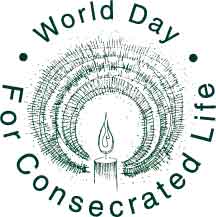 The 16th annual World Day for Consecrated Life will be observed in parishes in the United States the weekend of February 4-5.
The 16th annual World Day for Consecrated Life will be observed in parishes in the United States the weekend of February 4-5.The annual celebration was established by Pope John Paul II in 1997, to be marked each year on February 2, the Feast of the Presentation.
The U.S. bishops voted to observe the occasion the weekend following the feast, to highlight men and women religious in consecrated life as part of weekend Mass celebrations and to enable expressions of appreciation for the service of those who have chosen the consecrated life and to pray for an increase of vocations.
Archbishop Robert J. Carlson of St. Louis, chairman of the U.S. Conference of Catholic Bishops’ Committee on Clergy, Consecrated Life and Vocations (CCLV), heralded the role of religious.
“Many consecrated men and women share Christ’s light and love through their work in parish or diocesan ministries, education, health care, social services, spiritual direction and prayer,” he said. “Through their service and vows of poverty, chastity and obedience, they show that Jesus Christ is our most valued possession.”
The Church recognizes several forms of consecrated life, said Father Shawn McKnight, executive director of the Secretariat. “All who embrace the consecrated life promise poverty, chastity and obedience,” he said. “Religious priests, sisters and brothers live and pray in community, and they serve the Church in apostolic service or are wholly devoted to contemplation. Members of secular institutes fulfill their promises living within, not apart from, the world. Consecrated virgins, who are consecrated by the diocesan bishop, also serve the Church while remaining within the world, and hermits observe separation from the world in solitude, prayer and penance.”
Prayers of the Faithful, a bulletin announcement and a prayer card for the World Day for Consecrated Life can be found on the U.S. bishops’ website here .
In 1997, Pope John Paul II instituted a day of prayer for women and men in consecrated life. This celebration is attached to the Feast of the Presentation of the Lord on February 2nd. This Feast is also known as Candlemas Day; the day on which candles are blessed symbolizing Christ who is the light of the world. So too, those in consecrated life are called to reflect light of Jesus Christ to all peoples. The celebration of World Day for Consecrated Life is transferred to the following Sunday in order to highlight the gift of consecrated persons for the whole Church.
 Here’s what St. Thomas Aquinas, whose feast the universal Church celebrates today, had to say on the excellence of the vow of obedience:
Here’s what St. Thomas Aquinas, whose feast the universal Church celebrates today, had to say on the excellence of the vow of obedience: